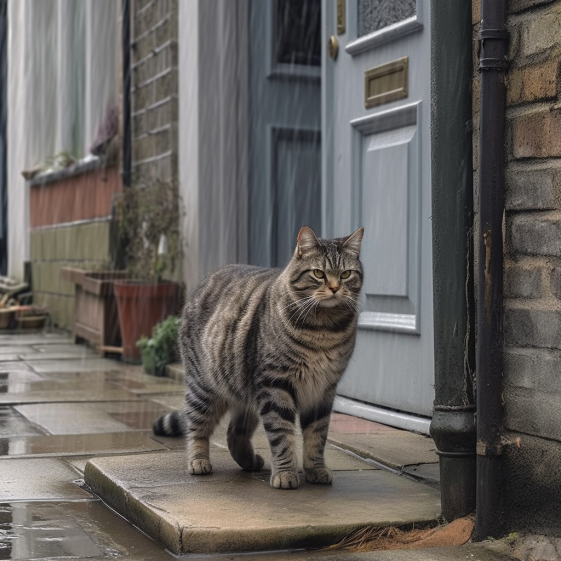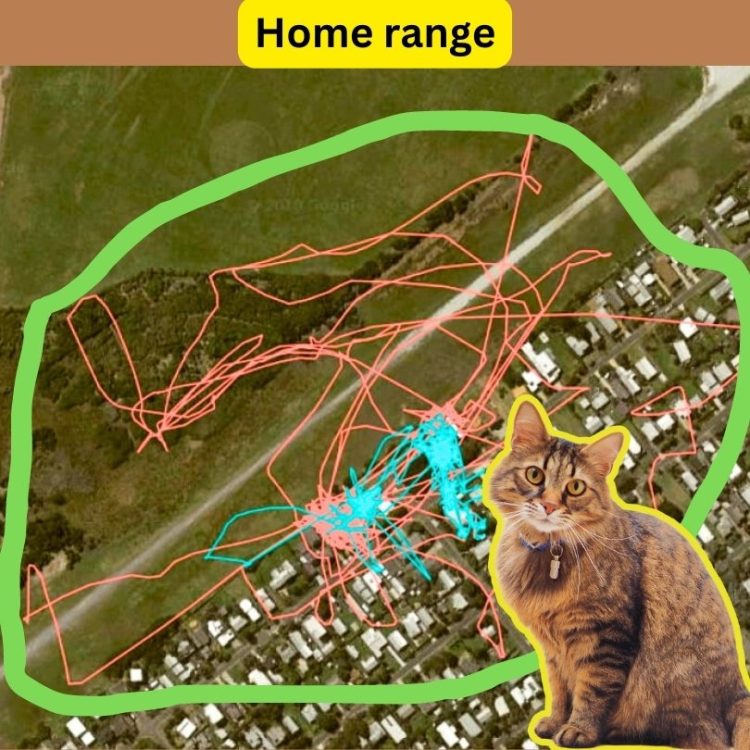Cats have a very good sense of direction. They cover long distances within their large territory. Some cats even travel for days and still cats find their way home. But how do cats manage to avoid getting lost in unfamiliar areas?
Table of Contents
How cats find their way home?
What exactly constitutes a cat’s good sense of direction is still not exactly clear. However, scientists agree that a good impression of one’s hometown is the basis. The cat may see its territory as a home, which offers it a place of retreat to which it wants to return. For this reason, a new cat should initially only be kept indoors after moving in (approx. 4-6 weeks). This way she can explore it in peace and recognize it as her new home.

Theories about how do cats find their way home
If you take the reference to the territory as a basis, various theories emerge as to how a cat always finds its way home:
The magnetic field theory
In this theory, scientists assume that cats orientate themselves based on the Earth’s magnetic fields . Some researchers assume that cats use the Earth’s magnetic field to orient themselves and thus cat find their way home. In fact, there are animals that use the magnetic field or its alignment of the field lines to orient themselves. In addition to birds, some fish, snails and other animal species, it has also been proven that dogs have a magnetic sense. Exactly how the magnetic field is perceived and whether cats really have this ability is not yet entirely clear. There are certain cells, the so-called magnetite cells, that can make this possible – but so far they have not been proven in dogs or cats.
The auditory image theory
In this theory, scientists see the cat’s excellent sense of hearing, smell and vision as the reason for its good orientation. They assume that cats memorize the sounds, smells and images of their homeland and store so-called “ auditory images ”. If they are far away from their territory, they can navigate their way and walk specifically towards stored impressions, such as the sound of church bells or the smell of the flowerbed in front of the house.
The sun theory
The assumption here is that cats orientate themselves based on the position of the sun . The lost cat remember the position of the sun in their homeland at different times of the day. This ability is called “astronavigation” and has been observed in birds.
The Morphic Field Theory
In this theory, the imprint on the home plays a particularly important role. It is believed that the cats develop a close familiarity and connection to the home place, a so-called ” morphic field “. This field allows a kind of telepathic communication with your home. This will help them find their way home.

A cat’s territory size
How large a lost cat’s territory really is can be determined using a small GPS tracker attached to a collar. Many owners are amazed at how far their little tigers actually run.
The radius of a normal small circle around the house is usually just under 50 meters . During an extended hunt and exploration session, some cats like to stray 0.5 to 1 kilometer away from home.
Unneutered tomcats usually have a larger territory than cats because they are looking for females who are willing to mate. There are also differences between city and country cats. Due to the denser development, cats in cities usually only have a small territory of 1,500 to 2,000 square meters . Cats living in rural areas can have a territory of 60,000 square meters and can sometimes walk 10 kilometers in one night .
How far the maximum distance from home can be for a missing cat to find its way back is unknown. In one experiment, a cat was abandoned 30 kilometers from its home and found its way back in just a few hours. However, in some press headlines you can occasionally find stories about cats that have traveled several thousand kilometers to get back home.
What to do if my cat goes missing?
Unfortunately, despite their good sense of direction & sense of smell, lost cats cannot always find their way back home. There is always the risk that a cat will be injured or accidentally trapped somewhere during its wanderings.
House cats who have escaped have a particularly difficult time because they don’t even know the area around the house and the unfamiliar situation causes them stress.
If your cat go missing, it is always important to remain calm first. Before they turn the environment outside upside down, they first start by searching the inside of the house. Even in rooms that have already been searched, there is usually still a hiding place that a cat could have crawled into. They find space in the tiniest of holes and sneak past you unnoticed. Hiding places under furniture, in cupboards or even behind the cupboard in a fitted kitchen are often popular! Above all, search basements , attics and tool sheds . These places offer ideal hiding places for the little tigers.
If the velvet paw cannot be found there, the search can be extended to the outside area, close to home:
- Search the area within a maximum radius of 500 meters (cats usually don’t run far away straight away).
- Check garages and garden sheds (including those of neighbors) because it is not uncommon for cats to be accidentally locked up.
- search the trees . Many cats climb up in panic but can’t get down on their own.
- Rattle the food bowl , call your cat and make familiar noises that the cat recognizes.
- They also look for them at night , when there is more peace and their calls can be heard better.
- Scared cats often sit quietly in their hiding place and often do not meow to draw attention to themselves. So look for even very small loopholes .
- If the cat escaped shortly after moving, it helps to drive to the old place of residence , if it is less than 5 km away, and search the area. (Many cats are drawn to their old territory if they have not yet accepted their new home.)
- Ask the surrounding animal shelters whether your cat was given there. Lost animals are also occasionally taken in for a short time at the local vet .
- If your own search is unsuccessful, hanging up search sheets (wanted posters) can help.

How far can cats smell their home?
Cats are highly intelligent animals and are naturally equipped with many highly sensitive senses.
Cats mainly have one:
- Well-developed olfactory organ,
- Sense of smell,
- Keen hearing,
- Sensitive cat fur and
- Well developed sense of touch in the paws.
Fact check: A cat’s olfactory organ has over 19 million receptors!
Did you know that? Indoor cats can live up to 20 years. If your cat is a house cat but also uses the outdoors, then it will live up to 14 years on average. Unfortunately, outdoor cats only live up to 5 years on average.
How to prevent your cat to go missing
Cold weather, territorial wars and much more can turn your furry friend’s outings into a nightmare. Don’t worry, here is a list of how to keep your cat safe:
Know your environment:
How safe is your garden? Even the most inconspicuous things can turn into insidious traps for your cat. Are there poisonous plants in your garden or a high risk of injury from objects lying around?
Keep them within your reach:
Cats, as you may know, love freedom. Therefore, building a fence is not the wisest decision. There are a few things you can do to make your garden cat-proof, but you can’t lock them in like a golden cage.
Beware of strays:
Who is the cat in your garden? Territorial fights often occur between two cats. Stray cats are usually hardier and won’t shy away from anything. Therefore, always be vigilant if you see a cat in your yard and don’t know who the owner is.
Now that you know that cats have a very strong sense of direction, you can use these tips to get your cat used to going outside , or you can get your cat used to a leash if you are still unsure whether your four-legged friend is ready to go outside on his own .
How do cats find their way home – FAQs
Q: How do cats find their way home?
A: Cats have a strong homing instinct and a keen ability to navigate their way back home if they get lost. They rely on their strong sense of smell to find their way back.
Q: Do indoor cats find their way back home if they get lost?
A: Indoor cats may struggle to find their way back home if they get lost since they are not used to navigating outdoor surroundings. It’s important to take precautions to prevent indoor cats from getting lost in the first place.
Q: What should I do if my cat is missing?
A: If your cat is missing, it’s important to act quickly. Start by searching your immediate area and then expand your search further out. Post flyers, check shelters, and notify your neighbors. Using familiar scents or sounds may attract a lost cat back home.
Q: How far can a cat find its way back from?
A: Cats have been known to find their way back home from miles away, showcasing their impressive homing abilities.
Q: What can I do to attract a lost cat back home?
A: Using familiar scents such as a used litter box or leaving out food and water can attract a lost cat back home. Additionally, creating a familiar environment by placing the cat’s bed or blanket outside may also help attract them back.
Q: Should I microchip my cat to ensure they can find their way back home?
A: Microchipping your cat is a great way to ensure they can be identified and returned home if they get lost. It’s a reliable method to help your cat find its way back home if they are found by someone else.
Q: What if my cat is an indoor cat and accidentally gets outside?
A: If your indoor cat becomes lost outside, it can be disorienting for them. It’s important to take immediate action to locate and safely bring your indoor cat back home.
Q: Can cats also rely on their homing abilities when traveling to new locations?
A: Cats have been known to navigate their way back to previously visited locations, showcasing their impressive homing abilities even when traveling to new places.
Q: How can I prevent my cat from getting lost if they have a strong desire to roam?
A: If your cat has a strong desire to explore and potentially roam away from home, it’s important to keep them indoors or provide a secure outdoor environment to prevent them from getting lost.
Q: What factors contribute to a cat’s ability to find its way back home?
A: A cat’s strong sense of smell, familiarity with the environment, and homing instincts are the key factors that contribute to their ability to find their way back home if they become lost.